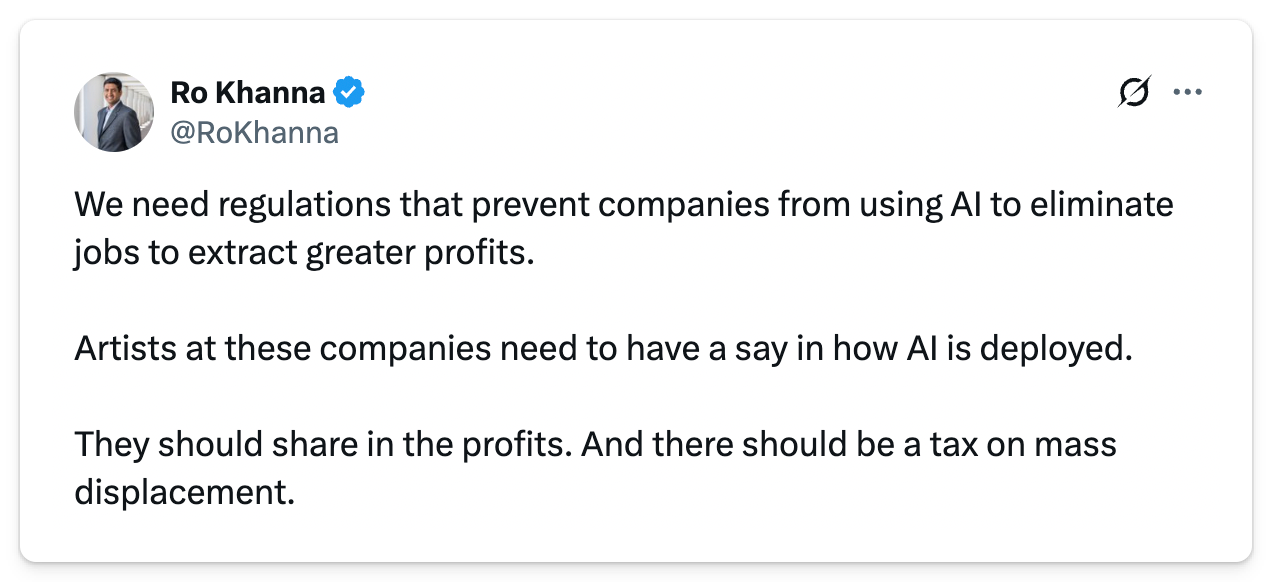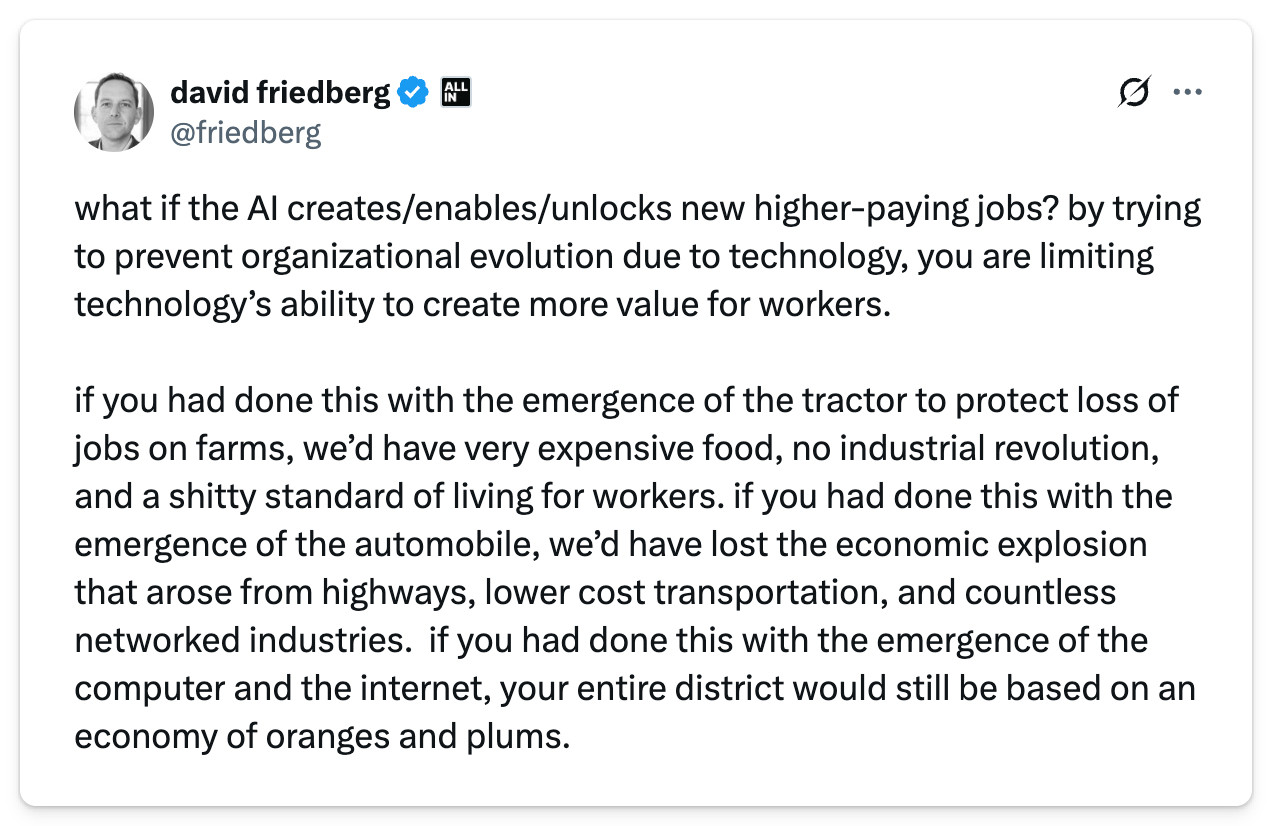Reaction to Khanna Shows Dems Need to Listen, Not Lecture, to Tech
In the wake of Democrats’ 2024 election losses, many postmortems have urged Democrats to do more listening and less lecturing.
The same is true for tech policy.
Take for example Representative Ro Khanna’s tweet last week responding to news that the latest Call of Duty video game uses a large amount of AI-generated artwork. In response, Khanna called for prohibitions on AI-driven efficiency; human artists having a say in their company’s AI deployment; profit-sharing with those employees; and a tax on mass displacement:
I take Khanna at his word: ensuring technology’s gains don’t just flow to billionaires.
But the tech community’s swift backlash to his comments reveals a deeper problem for Democrats: Valley founders, investors, and CEOs see in Khanna’s comments a party that reflexively lectures and demonizes builders instead of listening to them.
If we Democrats want to lead the AI century, we must reverse course – from Biden-era tech hostility to politicians partnering with the tech industry.
Tech Leaders Respond to Khanna
Khanna’s proposals may sound empowering on paper. But the angel investor and entrepreneur David Friedberg countered with history: Tractors displaced farmhands but made food abundant. Cars made blacksmiths obsolete but birthed an incredible era of mobility. Computers created Silicon Valley itself.
Zynga co-founder Mark Pincus - formerly a major Democratic donor - saw in Khanna’s attitude evidence of how Democrats went wrong on tech:
Harj Taggar, Managing Partner at startup incubator Y Combinator, said “I wish Dems would think about ways to help people find and thrive in the new jobs instead of again proposing regulations and taxes to stop progress.”
And Blake Scholl, CEO of Boom Supersonic, said he “want(ed) the old Democrats back” on tech policy.
Many of these tech leaders have considered themselves Democrats in the past, or have contributed significant funds to see Democrats succeed. These are people building tools that lower costs, save lives, and empower small entrepreneurs.
They aren’t committed to the Republican party; they yearn for the Democratic party to return to tech optimism and once again become the majority party of the Clinton and Obama years.
These are the people who have built a tech industry that not only powers America’s economy, but is the envy of the world. Policymakers should help them preserve America’s innovation edge.
If Democrats are serious about listening rather than lecturing, they should heed Valley leaders’ reactions (and Khanna, to his credit, invited debate).
Prepare People For the Future - Don’t Protect Them From It
I greatly admire Khanna’s previous advocacy for spreading tech prosperity beyond the Bay Area. That’s preparing people for the future - and making sure more people in more places benefit from tech opportunities.
But his proposals to tax automation or give workers a veto over AI in companies are instead more focused on protecting workers from the future.
Democrats can champion inclusion without anti-growth mandates. A recent Economic Innovation Group survey of workers found that far more workers see technology as an opportunity for their careers than as a threat:
Democrats have no shortage of ideas to spread tech opportunity more broadly. The New Democrat Coalition’s Innovation Agenda proposes to invest in worker upskilling, AI apprenticeships, and K-12 STEM education.
Or: create a National Digital Corps modeled on the Peace Corps. Foster regional tech hubs so people don’t have to relocate to the Valley. Invest in high speed broadband deployment.
Those are all ideas previously offered by Khanna. And they’re all much better than trying to halt progress.
Voters are Consumers, Not Just Workers
Too many Democrats are looking too narrowly at the impacts of technology. Khanna recently visited the Teamsters’ headquarters and pledged his support for one of their policy priorities: a ban on autonomous trucks.
Khanna framed his position as “prioritizing people over machines” and rejecting innovation that “benefits the few.”
But the reality is that about 5000 Americans die every year in trucking-related accidents - and we know from Waymo’s operations that autonomous vehicles are safer than human drivers. Supporting autonomous trucking is “prioritizing people over machines.”
Or take Khanna’s opposition to AI-designed video games. That may be bad for designer jobs, but it’s great for making games more affordable for consumers.
We Democrats have been narrowly fixated on voters as workers (particularly union workers) and under-fixated on voters as consumers, who want low prices, better services, and safe communities.
Economic Patriotism Means Beating China
Finally, Khanna frames his view on protecting workers from AI innovation as “economic patriotism,” seemingly focused on preventing job displacement.
An alternative view of “economic patriotism” is that we should nurture America’s AI companies in order to beat China’s rival AI companies in the world. And we should help Americans with the skyrocketing cost of living by embracing tech services that help bring down costs.
The Biden-era reflex to regulate first and ask questions later alienated the very industry we need to beat China. Valley founders aren’t cartoon villains; they’re building tools used by billions of people.
Democrats should aim to once again be the party that embraces technology to improve people’s lives, reduce their costs, and make them safer. We should be a party that prepares every American for the future - not a party that tries to shield Americans from innovation.
And tech leaders’ response to Khanna should be a wake-up call for Democrats: Listen to the builders.









This piece really made me think, particularly your point about Democrats needing to listen, not lecture, to tech, even though it's a tough balace to strike.
Whate er, bootlicker and paid-for propagandist for the Tech Oligarchy attempting to buy California! Fucking corporate Simp, hope the pay lasts long enough for you to enjoy it!
FUCK TECH OLIGARCJS NAD THEIR FASCISM!